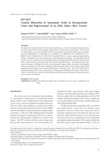To enhance the yield potential of rice by improving plant type, we have developed introgression lines (ILs: BC3-derived lines) with the genetic background of the elite indica variety IR64. A total of 334 ILs derived from crosses between IR64 as the recurrent parent and 10 donor parents (nine new-plant-type lines IR65600-87-2-2-3, IR65598-112-2, IR65564-2-2-3, IR69093-41-2-3-2, IR69125-25-3-1-1,IR66215-44-2-3, IR68522-10-2-2, IR71195-AC1 and IR66750-6-2-1, and one Japanese high-yielding cultivar, ‘Hoshiaoba’) have been developed by recurrent backcross breeding. The agronomic traits of the 334 ILs were evaluated in the experimental field of the International Rice Research Institute from 2005 to 2007, and their genotypes were determined using SSR markers. Several agronomic traits (days to heading, leaf length and width, culm and panicle length, number of panicles, total spikelet number per panicle, and 100-grain weight) were dissected genetically by QTL analysis using hybrid populations derived from crosses between IR64 and ILs with unique traits. More than 30 QTLs were detected and their effects were confirmed by developing and evaluating near-isogenic lines (NILs). These ILs and NILs are useful for both breeding and further genetic dissection of agronomic traits across various environments.

